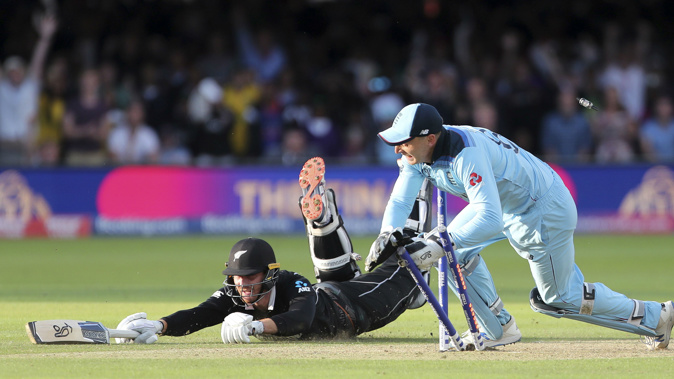
As the dust settles and the analysis pours in on the "greatest ODI match of all time", Kiwi cricket fans have been left wondering just how robbed they were of their first World Cup title.
Lost in the thrilling late-match madness was one key question; were England awarded one run too many during the chaotic scenes of Trent Boult's final over to Ben Stokes?
In arguably the key moment in England's run-chase, Stokes inadvertently sent a throw from deep midwicket skimming to the third man boundary, after diving for his crease in a bid to complete his second run.
After consultation with his colleagues, umpire Kumar Dharmasena signalled six runs for the incident, meaning that England - seemingly drifting out of contention needing nine runs from three balls, now only needed three more from two.
However, a leading cricket expert - espncricinfo.com's Andrew Miller - claims England were awarded one run too many.
According to Law 19.8, pertaining to "Overthrow or wilful act of fielder", it would appear that England's second on-field run should not have counted, making it a total of five runs for the incident, not six.
/arc-anglerfish-syd-prod-nzme.s3.amazonaws.com/public/6X7FHII3PBF2PJ7B2WL64S67KE.jpg)
MCC members celebrate after England's Ben Stokes got a boundary from overthrows during the Cricket World Cup final match between England and New Zealand. Photo / AP
The law states: "If the boundary results from an overthrow or from the wilful act of a fielder, the runs scored shall be any runs for penalties awarded to either side, and the allowance for the boundary, and the runs completed by the batsmen, together with the run in progress if they had already crossed at the instant of the throw or act."
A review of the footage of the incident shows clearly that, at the moment the ball was released by the New Zealand fielder, Martin Guptill, Stokes and his partner, Adil Rashid, had not yet crossed for their second run.
There is potential scope for ambiguity in the wording of the law, given that it references throw or "act", which may pertain to the moment the ball deflected off Stokes' bat. However, there is no reference to the batsman's actions at any other point in the Law.
Stokes said he "will be apologising to Kane for the rest of my life" for the incidental overthrows, and while it's a cricketing quirk that is seen on rare occasions, never had the rule - where the ball remains live on deflections off throws- been implemented in anywhere close to the massive moment in which it reared its ugly head today.
"The rule's been there for a long time, and I don't think anything like that's happened has it, where you now question it," said Williamson.
"You can't look at that and think that decided the match, there were so many other bits and pieces to that game that were so important. When it comes down to a tie, you start questioning every delivery, don't you? It was a pretty tough pill to swallow that, when we were looking pretty likely with Trent bowling really well, but it's one of those things."
Take your Radio, Podcasts and Music with you









